【新课标】Unit 6 Healthy diet 第3课时Grammar课件
文档属性
| 名称 | 【新课标】Unit 6 Healthy diet 第3课时Grammar课件 |
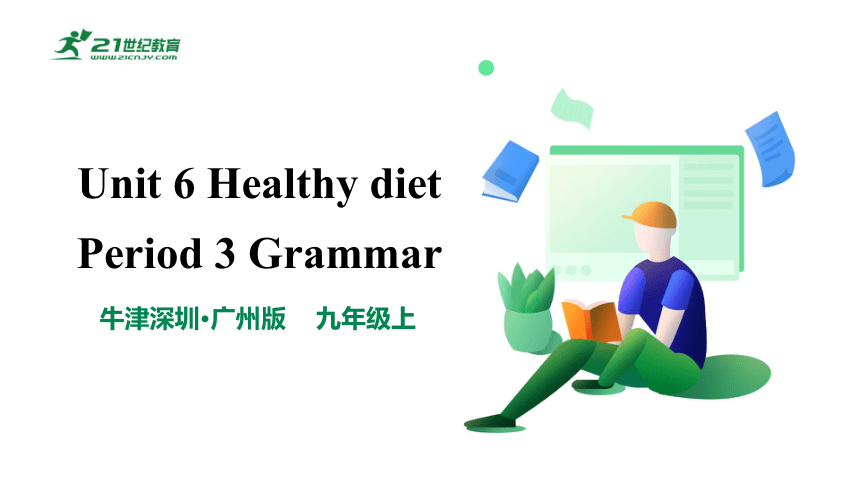
|
|
| 格式 | pptx | ||
| 文件大小 | 9.0MB | ||
| 资源类型 | 试卷 | ||
| 版本资源 | 牛津深圳版 | ||
| 科目 | 英语 | ||
| 更新时间 | 2022-10-31 18:02:37 | ||
图片预览

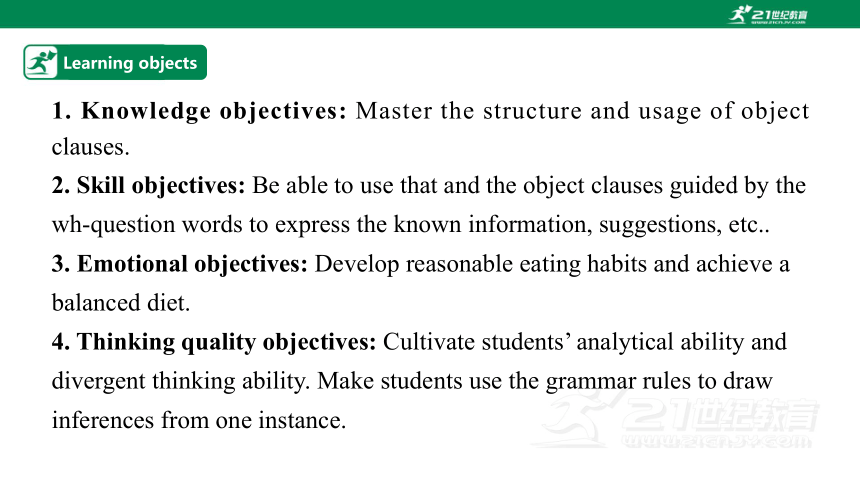

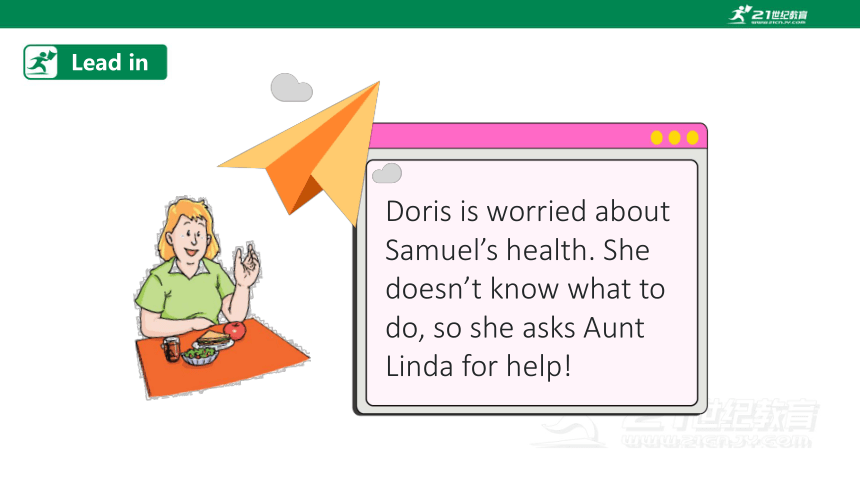

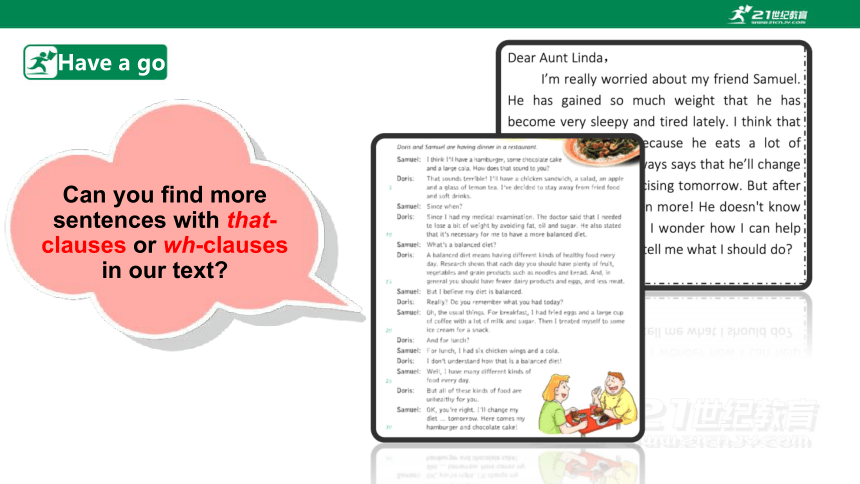
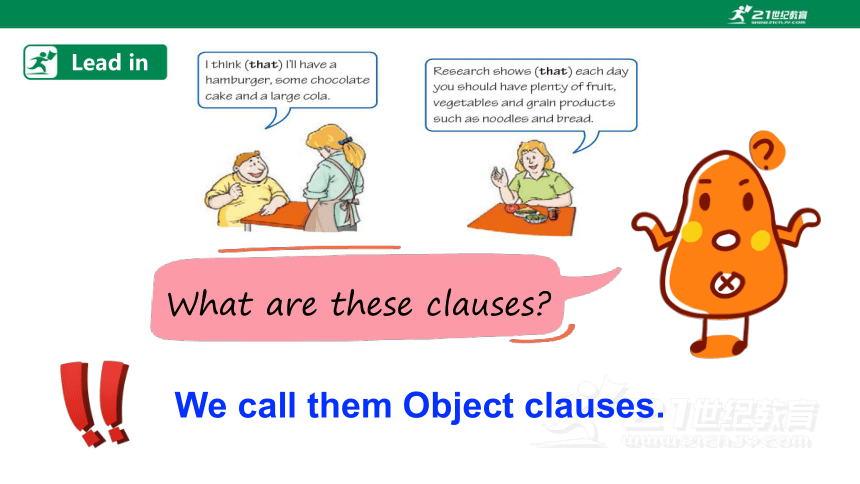
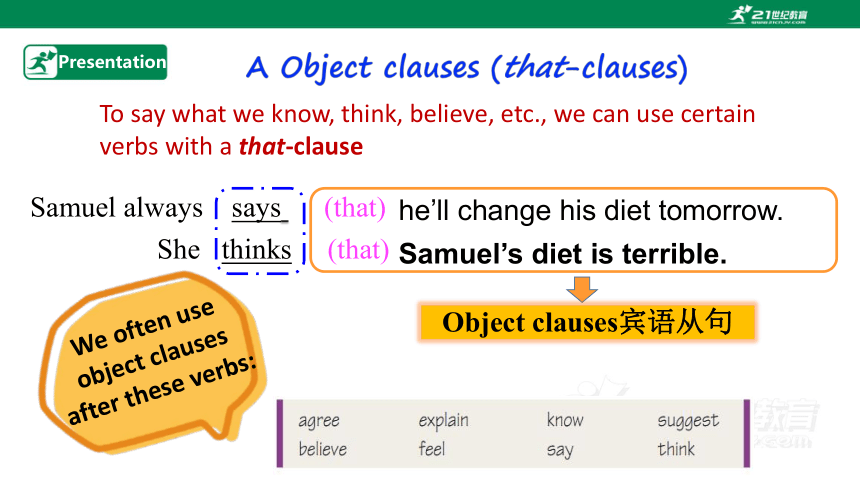
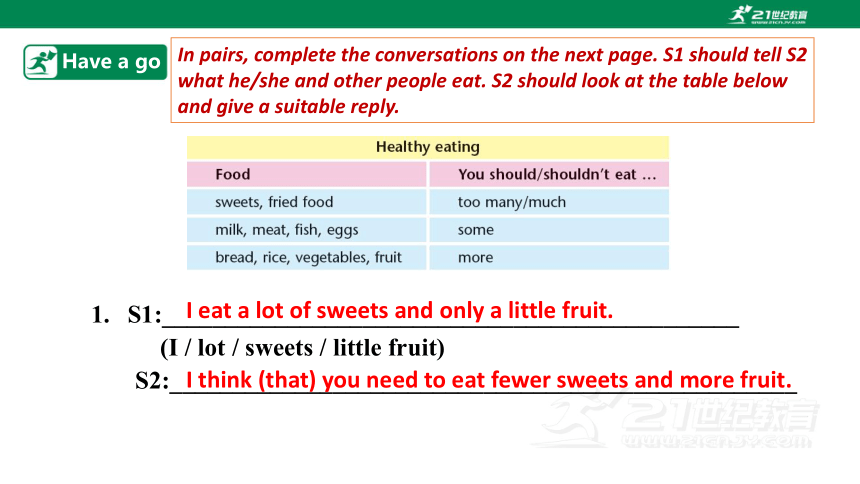

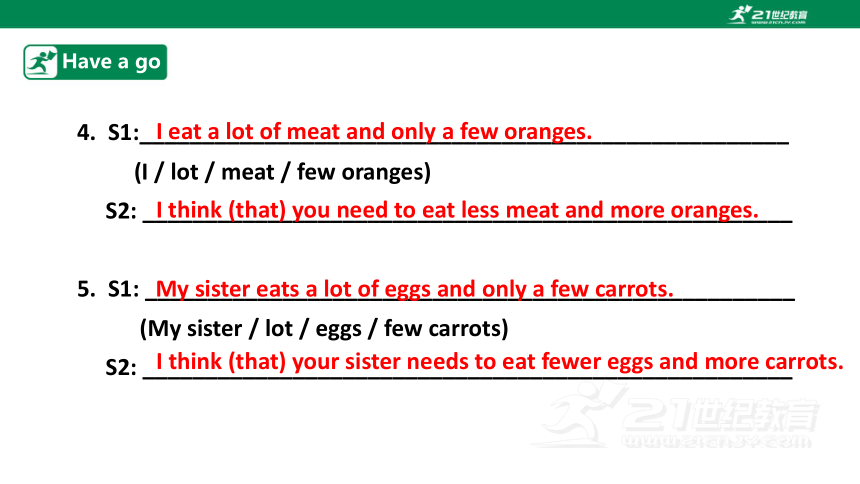
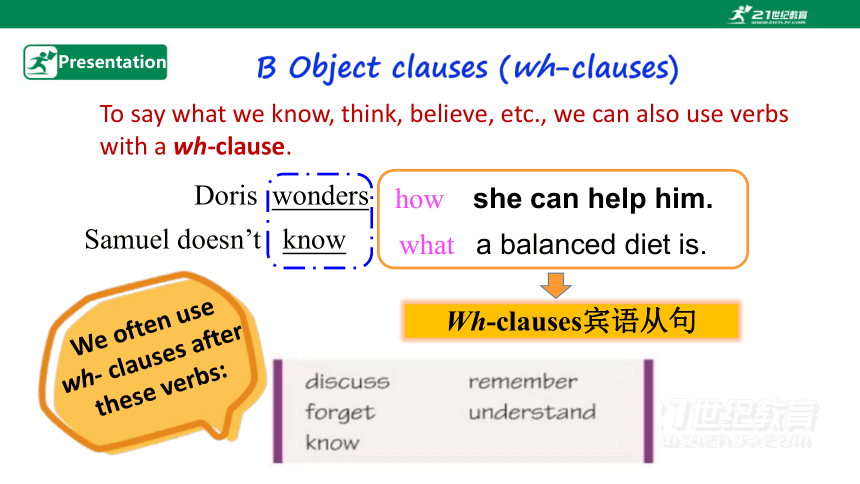
文档简介
(共38张PPT)
Unit 6 Healthy diet
Period 3 Grammar
牛津深圳·广州版 九年级上
1. Knowledge objectives: Master the structure and usage of object clauses.
2. Skill objectives: Be able to use that and the object clauses guided by the wh-question words to express the known information, suggestions, etc..
3. Emotional objectives: Develop reasonable eating habits and achieve a balanced diet.
4. Thinking quality objectives: Cultivate students’ analytical ability and divergent thinking ability. Make students use the grammar rules to draw inferences from one instance.
Learning objects
Do you remember who they are
They are Samuel and Doris.
Do you remember what they are talking about
Healthy Diet!
Lead in
Doris is worried about Samuel’s health. She doesn’t know what to do, so she asks Aunt Linda for help!
Lead in
Dear Aunt Linda,
I’m really worried about my friend Samuel. He has gained so much weight that he has become very sleepy and tired lately. I think that his diet is terrible because he eats a lot of unhealthy food. He always says that he’ll change his diet and start exercising tomorrow. But after exercising, he eats even more! He doesn't know what a healthy diet is! I wonder how I can help him. Could you please tell me what I should do
Doris
She thinks that his diet is terrible.
Samuel doesn’t know what a healthy diet is!
What does Doris think of Samuel’s diet
What doesn’t Samuel know
Lead in
Can you find more sentences with that-clauses or wh-clauses in our text
Have a go
Lead in
We call them Object clauses.
What are these clauses
She thinks (that)
Samuel always says (that)
Samuel’s diet is terrible.
he’ll change his diet tomorrow.
Object clauses宾语从句
We often use object clauses after these verbs:
Presentation
To say what we know, think, believe, etc., we can use certain verbs with a that-clause
A Object clauses (that-clauses)
S1:______________________________________________
(I / lot / sweets / little fruit)
S2:__________________________________________________
I eat a lot of sweets and only a little fruit.
I think (that) you need to eat fewer sweets and more fruit.
In pairs, complete the conversations on the next page. S1 should tell S2 what he/she and other people eat. S2 should look at the table below and give a suitable reply.
Have a go
2. S1:________________________________________
(I / lot / fried food / little bread)
S2: ____________________________________________________
3. S1:_____________________________________________________
(My brother / lot / meat / few vegetables)
S2: _____________________________________________________
_________________________________
I eat a lot of fried food and only a little bread.
I think (that) you need to eat less fried food and more bread.
My brother eats a lot of meat and only a few vegetables.
I think (that) your brother needs to eat less meat and more vegetables.
Have a go
4. S1:____________________________________________________
(I / lot / meat / few oranges)
S2: ____________________________________________________
5. S1: ____________________________________________________
(My sister / lot / eggs / few carrots)
S2: ____________________________________________________
I think (that) you need to eat less meat and more oranges.
My sister eats a lot of eggs and only a few carrots.
I eat a lot of meat and only a few oranges.
I think (that) your sister needs to eat fewer eggs and more carrots.
Have a go
Samuel doesn’t know
Doris wonders
what a balanced diet is.
how she can help him.
Presentation
B Object clauses (wh-clauses)
To say what we know, think, believe, etc., we can also use verbs with a wh-clause.
We often use wh- clauses after these verbs:
Wh-clauses宾语从句
In pairs, ask and answer the questions. Follow the example.
Have a go
1 How many meals do you usually have each day
(Three big meals./Several small meals./...)
Have a go
Do you know how many meals I usually have each day
I think (that) you usually have three big meals each day.
2 Which meal is the most important
(Breakfast./Lunch./Dinner.)
Do you know which meal is the most important
I think(that) breakfast is the most important (meal).
Have a go
3 Who do you usually have lunch with at the weekend
(Parents./Friends./...)
Do you know who I usually have lunch with at the weekend
I think(that) you usually have lunch with your parents.
Have a go
4 Where do you usually have dinner
(At home./In the restaurant./...)
Do you know where I usually dinner
I think(that) you usually have dinner in the restaurant.
Have a go
5 When do you usually have dinner
(At 6 p.m./At 8 p.m./...)
Do you know when I usually have dinner
I think(that) you usually have dinner at 7 p.m.
Have a go
6 How many glasses of water do you drink every day
(1-5 glasses./6-8 glasses./...)
Do you know how many glasses of water I drink every day
I think(that) you think 3 glasses of water every day.
Have a go
She
thinks
that
Samuel’s diet is terrible.
Main clause
主句
Connector
连接词
Object clause
宾语从句
Subject 主语
主语 +谓语动词
+ (that)
that
+ 陈述句
Statement陈述句
Summary
Verb 谓语动词
Object Clause
a balanced diet is.
Object clause
宾语从句
特殊疑问词引导的宾语从句,要遵循陈述句语序,即主语放在动词前。
Samuel
doesn’t know
Main clause
主句
特殊疑问词引导的宾语从句,引导词有意义,不能去掉。
主语 +谓语动词
+ 特殊疑问词
+ 陈述句
Summary
Subject 主语
Verb 谓语动词
what
Statement陈述句
将下列句子改成陈述句语序:
1. Is there a bank near here
2. Is it on Fifth Avenue
3. Are they doing homework
There is a bank near here.
It is on Fifth Avenue.
They are doing homework.
Have a go
4. Does she work in a hospital
5. Did you go to Center Park
6. Do we have to wear a uniform
7. Can we wear hats in school
she works in a hospital.
you went to Center Park.
we have to wear a uniform.
we can wear hats in school.
Have a go
8.Where’s your pen pal from
9. Where does he live
10.What language does she speak
11.Why do you like pandas
Where your pen pal is from.
Where he lives.
What language she speaks.
Why you like pandas.
Have a go
(根据主句时态)确定从句的时态
主句时态
从 句 时 态
连 接 前
连 接 后
一般现在时
时态保持不变
一般过去时
一般现在时
一般过去时
一般过去时
过去完成时
一般将来时
过去将来时
现在进行时
过去进行时
现在完成时
过去完成时
Summary
宾语从句的时态
I hear (that)
Jim ( be ) a worker two years ago.
Jim ( be ) an English teacher now.
Jim ( cook ) dinner tomorrow.
Jim ( sing ) a popular song now.
was
is
will cook
is singing
当主句是一般现在时,宾语从句的时态不作限制,我们可以根据句子的需要使用任何一种时态。(需要性原则)
Summary
当主句是一般过去时的时候,宾语从句必须运用相应的过去的某一种时态,从而达到主句和从句的相互一致。(呼应性原则)
He to Hong Kong .
He sick.
He a book .
He
He said
would go
was
was reading
his work.
had finished
Summary
当宾语从句说明的是客观存在的事实或者是客观存在的真理时,就不用受到主句时态的限制,仍是用一般现在时态。(特殊性原则)
He told me (that)
Summer after Spring .
is
I was told (that)
the sun much bigger than the moon.
is
no news good news.
My parents told me (that)
is
Summary
Find out the mistakes and correct them.
Could you tell me where do they live
She knew that Danny is a student.
He told me that winter was colder than autumn.
Do you know who car it is
was
is
whose
Summary
宾语从句三要素
引导词
that(陈述句 )
if/whether(一般疑问句 )
特殊疑问词(特殊疑问句)
时态
主句为一般现在时从句可为任何时态
主句为一般过去时
从句
一般过去时
过去将来时
过去进行时
过去完成时
语序
宾语从句的语序都为陈述句语序
客观真理 自然现象
公式定理 名言警句 时态不变
Summary
( )1. I don’t know ________ the day after tomorrow.
A. when does he comes B. how will he come
C. whether he'll come D. if will he come
( )2. The teacher said that the Earth _______ around the Sun.
A. goes B. went C. will go D. has gone
( )3. — Could you tell me ________?
— Sorry, I don't know. I was not at the meeting.
A. what does he say at the meeting
B. what did he say at the meeting
C. what he says at the meeting
D. what he said at the meeting
一、单项选择
Exercise
C
A
D
( )4. — The light in Carl's room is still on. Do you know _____
— To prepare for the coming exam, I think.
A. why he stays up so late B. if he works hard
C. why is he so busy D. when he will stop working
( )5. — Betty, could you tell me ________
— About ten minutes.
A. how far is it from your home to school
B. how far it is from your home to school
C. how long does it take you to walk to school
D. how long it takes you to walk to school
Exercise
A
D
1. These flowers are from Guangdong. He said.
He said _______ these flowers _______ from Guangdong.
2. Light goes faster than sound. My teacher told me.
My teacher told me _____ light _______ faster than sound.
3. There will be a meeting in five days. Jack didn’t know.
Jack didn’t know _____ there _______ ____ a meeting in five days.
that were
that goes
二、将下列句子改为宾语从句。
Exercise
that would be
4. What’s his name I asked him.
I asked him what _____ ______ _____.
5. Where did she put her car Do you know
Do you know _______ _____ _____ her car
6. What does he often talk about The girl wondered.
The girl wondered _____ _____ often _______about.
his name was
Exercise
where she put
what he talked
Homework
Finish Grammar exercise paper.
Early to bed and early to rise make a man healthy, wealthy and wise.
早睡早起,令人健康、富有而且聪明。
Reflection
谢谢
21世纪教育网(www.21cnjy.com)
中小学教育资源网站
兼职招聘:
https://www.21cnjy.com/recruitment/home/admin
Unit 6 Healthy diet
Period 3 Grammar
牛津深圳·广州版 九年级上
1. Knowledge objectives: Master the structure and usage of object clauses.
2. Skill objectives: Be able to use that and the object clauses guided by the wh-question words to express the known information, suggestions, etc..
3. Emotional objectives: Develop reasonable eating habits and achieve a balanced diet.
4. Thinking quality objectives: Cultivate students’ analytical ability and divergent thinking ability. Make students use the grammar rules to draw inferences from one instance.
Learning objects
Do you remember who they are
They are Samuel and Doris.
Do you remember what they are talking about
Healthy Diet!
Lead in
Doris is worried about Samuel’s health. She doesn’t know what to do, so she asks Aunt Linda for help!
Lead in
Dear Aunt Linda,
I’m really worried about my friend Samuel. He has gained so much weight that he has become very sleepy and tired lately. I think that his diet is terrible because he eats a lot of unhealthy food. He always says that he’ll change his diet and start exercising tomorrow. But after exercising, he eats even more! He doesn't know what a healthy diet is! I wonder how I can help him. Could you please tell me what I should do
Doris
She thinks that his diet is terrible.
Samuel doesn’t know what a healthy diet is!
What does Doris think of Samuel’s diet
What doesn’t Samuel know
Lead in
Can you find more sentences with that-clauses or wh-clauses in our text
Have a go
Lead in
We call them Object clauses.
What are these clauses
She thinks (that)
Samuel always says (that)
Samuel’s diet is terrible.
he’ll change his diet tomorrow.
Object clauses宾语从句
We often use object clauses after these verbs:
Presentation
To say what we know, think, believe, etc., we can use certain verbs with a that-clause
A Object clauses (that-clauses)
S1:______________________________________________
(I / lot / sweets / little fruit)
S2:__________________________________________________
I eat a lot of sweets and only a little fruit.
I think (that) you need to eat fewer sweets and more fruit.
In pairs, complete the conversations on the next page. S1 should tell S2 what he/she and other people eat. S2 should look at the table below and give a suitable reply.
Have a go
2. S1:________________________________________
(I / lot / fried food / little bread)
S2: ____________________________________________________
3. S1:_____________________________________________________
(My brother / lot / meat / few vegetables)
S2: _____________________________________________________
_________________________________
I eat a lot of fried food and only a little bread.
I think (that) you need to eat less fried food and more bread.
My brother eats a lot of meat and only a few vegetables.
I think (that) your brother needs to eat less meat and more vegetables.
Have a go
4. S1:____________________________________________________
(I / lot / meat / few oranges)
S2: ____________________________________________________
5. S1: ____________________________________________________
(My sister / lot / eggs / few carrots)
S2: ____________________________________________________
I think (that) you need to eat less meat and more oranges.
My sister eats a lot of eggs and only a few carrots.
I eat a lot of meat and only a few oranges.
I think (that) your sister needs to eat fewer eggs and more carrots.
Have a go
Samuel doesn’t know
Doris wonders
what a balanced diet is.
how she can help him.
Presentation
B Object clauses (wh-clauses)
To say what we know, think, believe, etc., we can also use verbs with a wh-clause.
We often use wh- clauses after these verbs:
Wh-clauses宾语从句
In pairs, ask and answer the questions. Follow the example.
Have a go
1 How many meals do you usually have each day
(Three big meals./Several small meals./...)
Have a go
Do you know how many meals I usually have each day
I think (that) you usually have three big meals each day.
2 Which meal is the most important
(Breakfast./Lunch./Dinner.)
Do you know which meal is the most important
I think(that) breakfast is the most important (meal).
Have a go
3 Who do you usually have lunch with at the weekend
(Parents./Friends./...)
Do you know who I usually have lunch with at the weekend
I think(that) you usually have lunch with your parents.
Have a go
4 Where do you usually have dinner
(At home./In the restaurant./...)
Do you know where I usually dinner
I think(that) you usually have dinner in the restaurant.
Have a go
5 When do you usually have dinner
(At 6 p.m./At 8 p.m./...)
Do you know when I usually have dinner
I think(that) you usually have dinner at 7 p.m.
Have a go
6 How many glasses of water do you drink every day
(1-5 glasses./6-8 glasses./...)
Do you know how many glasses of water I drink every day
I think(that) you think 3 glasses of water every day.
Have a go
She
thinks
that
Samuel’s diet is terrible.
Main clause
主句
Connector
连接词
Object clause
宾语从句
Subject 主语
主语 +谓语动词
+ (that)
that
+ 陈述句
Statement陈述句
Summary
Verb 谓语动词
Object Clause
a balanced diet is.
Object clause
宾语从句
特殊疑问词引导的宾语从句,要遵循陈述句语序,即主语放在动词前。
Samuel
doesn’t know
Main clause
主句
特殊疑问词引导的宾语从句,引导词有意义,不能去掉。
主语 +谓语动词
+ 特殊疑问词
+ 陈述句
Summary
Subject 主语
Verb 谓语动词
what
Statement陈述句
将下列句子改成陈述句语序:
1. Is there a bank near here
2. Is it on Fifth Avenue
3. Are they doing homework
There is a bank near here.
It is on Fifth Avenue.
They are doing homework.
Have a go
4. Does she work in a hospital
5. Did you go to Center Park
6. Do we have to wear a uniform
7. Can we wear hats in school
she works in a hospital.
you went to Center Park.
we have to wear a uniform.
we can wear hats in school.
Have a go
8.Where’s your pen pal from
9. Where does he live
10.What language does she speak
11.Why do you like pandas
Where your pen pal is from.
Where he lives.
What language she speaks.
Why you like pandas.
Have a go
(根据主句时态)确定从句的时态
主句时态
从 句 时 态
连 接 前
连 接 后
一般现在时
时态保持不变
一般过去时
一般现在时
一般过去时
一般过去时
过去完成时
一般将来时
过去将来时
现在进行时
过去进行时
现在完成时
过去完成时
Summary
宾语从句的时态
I hear (that)
Jim ( be ) a worker two years ago.
Jim ( be ) an English teacher now.
Jim ( cook ) dinner tomorrow.
Jim ( sing ) a popular song now.
was
is
will cook
is singing
当主句是一般现在时,宾语从句的时态不作限制,我们可以根据句子的需要使用任何一种时态。(需要性原则)
Summary
当主句是一般过去时的时候,宾语从句必须运用相应的过去的某一种时态,从而达到主句和从句的相互一致。(呼应性原则)
He to Hong Kong .
He sick.
He a book .
He
He said
would go
was
was reading
his work.
had finished
Summary
当宾语从句说明的是客观存在的事实或者是客观存在的真理时,就不用受到主句时态的限制,仍是用一般现在时态。(特殊性原则)
He told me (that)
Summer after Spring .
is
I was told (that)
the sun much bigger than the moon.
is
no news good news.
My parents told me (that)
is
Summary
Find out the mistakes and correct them.
Could you tell me where do they live
She knew that Danny is a student.
He told me that winter was colder than autumn.
Do you know who car it is
was
is
whose
Summary
宾语从句三要素
引导词
that(陈述句 )
if/whether(一般疑问句 )
特殊疑问词(特殊疑问句)
时态
主句为一般现在时从句可为任何时态
主句为一般过去时
从句
一般过去时
过去将来时
过去进行时
过去完成时
语序
宾语从句的语序都为陈述句语序
客观真理 自然现象
公式定理 名言警句 时态不变
Summary
( )1. I don’t know ________ the day after tomorrow.
A. when does he comes B. how will he come
C. whether he'll come D. if will he come
( )2. The teacher said that the Earth _______ around the Sun.
A. goes B. went C. will go D. has gone
( )3. — Could you tell me ________?
— Sorry, I don't know. I was not at the meeting.
A. what does he say at the meeting
B. what did he say at the meeting
C. what he says at the meeting
D. what he said at the meeting
一、单项选择
Exercise
C
A
D
( )4. — The light in Carl's room is still on. Do you know _____
— To prepare for the coming exam, I think.
A. why he stays up so late B. if he works hard
C. why is he so busy D. when he will stop working
( )5. — Betty, could you tell me ________
— About ten minutes.
A. how far is it from your home to school
B. how far it is from your home to school
C. how long does it take you to walk to school
D. how long it takes you to walk to school
Exercise
A
D
1. These flowers are from Guangdong. He said.
He said _______ these flowers _______ from Guangdong.
2. Light goes faster than sound. My teacher told me.
My teacher told me _____ light _______ faster than sound.
3. There will be a meeting in five days. Jack didn’t know.
Jack didn’t know _____ there _______ ____ a meeting in five days.
that were
that goes
二、将下列句子改为宾语从句。
Exercise
that would be
4. What’s his name I asked him.
I asked him what _____ ______ _____.
5. Where did she put her car Do you know
Do you know _______ _____ _____ her car
6. What does he often talk about The girl wondered.
The girl wondered _____ _____ often _______about.
his name was
Exercise
where she put
what he talked
Homework
Finish Grammar exercise paper.
Early to bed and early to rise make a man healthy, wealthy and wise.
早睡早起,令人健康、富有而且聪明。
Reflection
谢谢
21世纪教育网(www.21cnjy.com)
中小学教育资源网站
兼职招聘:
https://www.21cnjy.com/recruitment/home/admin
